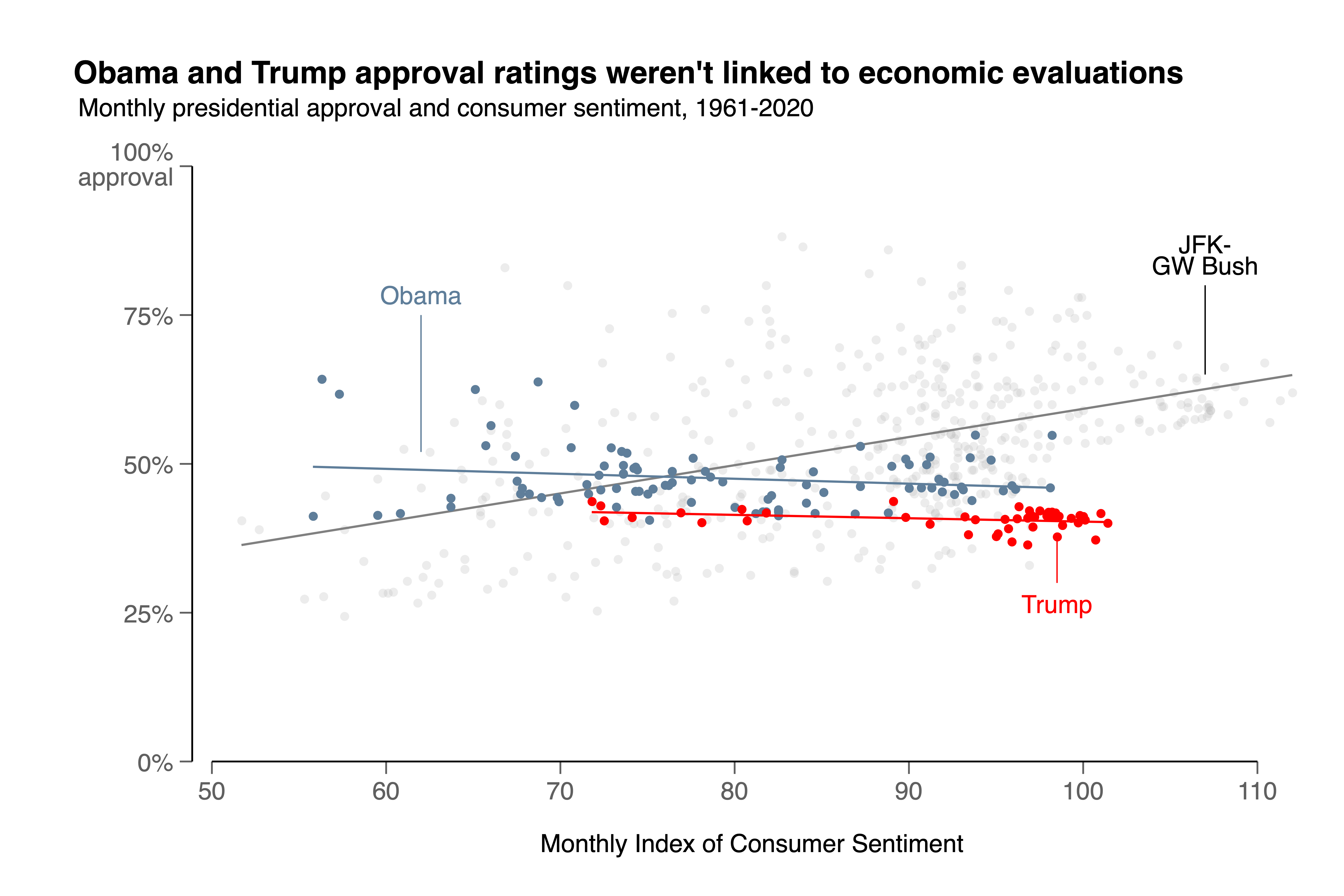When Joe Biden was elected president, a common refrain was that he would usher in a new era of “normalcy” after four chaotic years of President Donald Trump. But in certain ways, normalcy hasn’t returned. This is visible first and foremost in the inflation rate, which in May was higher than at any point since 1981.
But this growing inflation, and the resulting pessimism about the economy, has restored one thing to normal: the historical relationship between how Americans view the economy and how they view the president.
For a long time, “it’s the economy, stupid” was solid advice for understanding presidential approval. Approval increased when the economy grew. See, for example, Bill Clinton’s rising popularity during the robust economy of the late 1990s. And approval dropped during recessions — as it did for George H.W. Bush in 1991.
But during the administrations of Barack Obama and Trump, this link between the economy and presidential approval appeared weaker, even nonexistent. This was evident in the relationship between presidential approval and the University of Michigan Survey Research Center’s Index of Consumer Sentiment, a long-standing measure of economic evaluations that combines different questions about how people perceive their personal financial circumstances and business conditions in the country. This index has a historical low of 50 and a historical high of 112.
For all the presidents from John F. Kennedy to George W. Bush, higher levels of consumer sentiment were associated with higher levels of presidential approval, as the figure below shows. To measure average monthly presidential approval ratings, we relied on compendiums from various scholars, HuffPost Pollster and, more recently, FiveThirtyEight.

But then, under Obama and Trump, that changed. During their presidencies, there was very little relationship between consumer sentiment and presidential approval.

Obama’s approval rating barely budged even as consumer sentiment rebounded from its low point during the Great Recession of 2008 to 2009. Trump’s approval rating was chronically low despite high levels of consumer sentiment, and it did not drop any lower even when consumer sentiment decreased during the recession induced by the covid-19 pandemic.
This curious feature of the Obama and Trump presidencies has been documented in political science research. One explanation is that in an era of strong partisanship, it’s harder for presidents to win over many opposite-party voters in periods of economic growth, or lose the support of their own party’s voters in a recession.
But Biden’s presidency looks different, at least so far. As consumer sentiment has dropped, Biden’s approval rating has dropped with it. Here is that same graph, including data from Biden’s presidency through June.

The relationship is clear: Biden’s approval rating is lower now that consumer sentiment has dropped. The size of that relationship — depicted in the blue line — is almost identical to the relationship that existed from 1961 to 2008.
Of course, the decline in Biden’s approval may have had other sources. Presidents usually lose support as the post-inauguration “honeymoon” period wears off. Biden also faced new surges of covid-19 and the messy withdrawal of U.S. forces from Afghanistan in August 2021. Nevertheless, Americans’ views of the economy help explain Biden’s lower approval.
This raises a more optimistic possibility for Biden: His approval rating may increase if the inflation rate declines and consumer sentiment improves. Already, the Federal Reserve has raised interest rates and consumer spending has dropped — both of which could help bring prices down. At the same time, there remains the risk of an outright recession, which could affect Biden’s approval in a way that it didn’t for Obama and Trump.
Regardless, the implication for Biden is clear: Unlike his two recent predecessors in the White House, his political fortunes may depend on the direction the economy takes.



